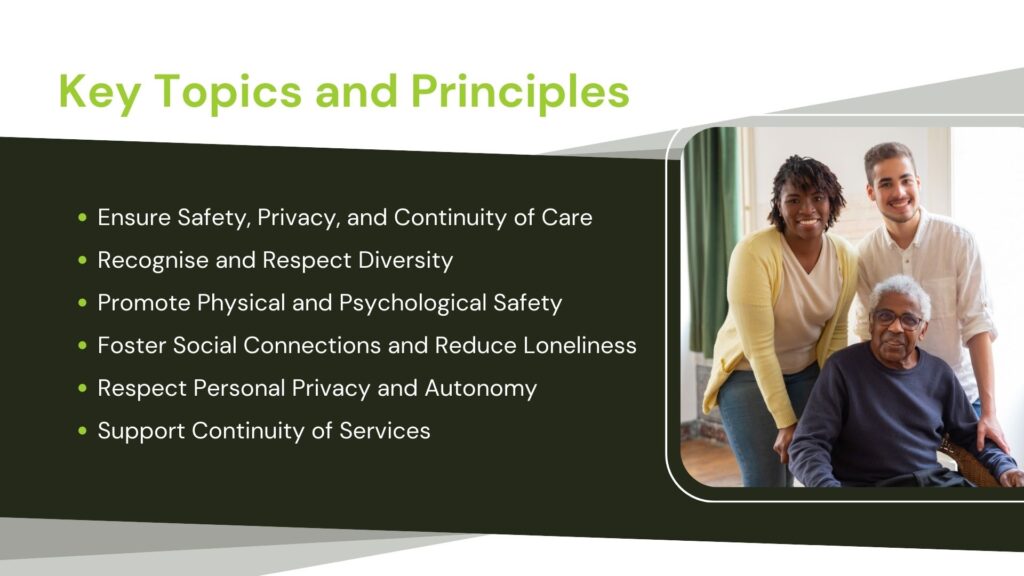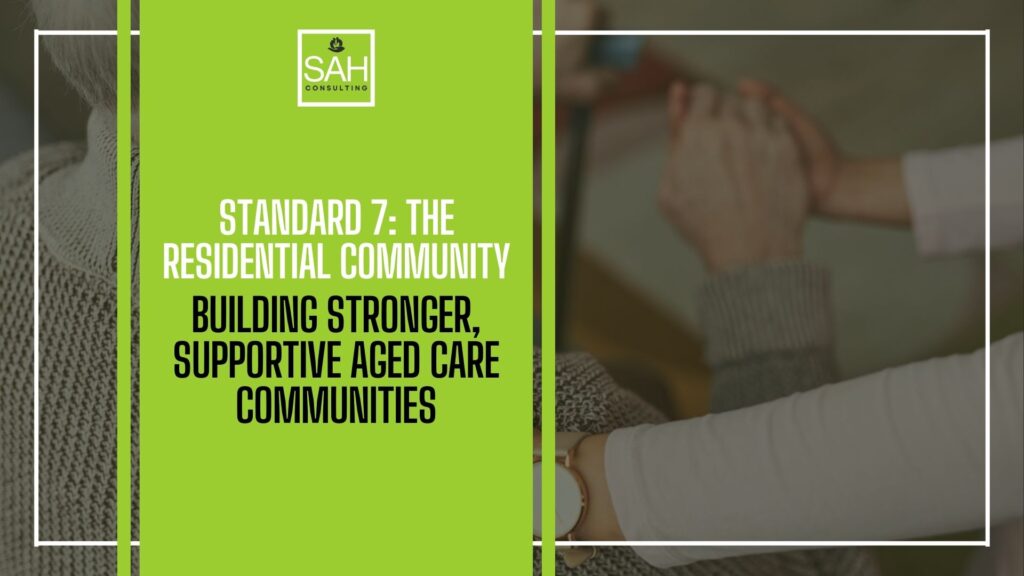The Strengthened Aged Care Quality Standards Provider Guidance 2025 sets clear expectations for residential care providers, ensuring older people receive high-quality, person-centred care. As part of our series exploring each of the quality standards in aged care, this article dives into Standard 7: The Residential Community, which focuses on creating safe, inclusive, and connected environments where older people feel valued and at home.
What This Standard Means
Standard 7 is about making the residential community a vibrant, supportive hub that enhances the quality of life for older people. When someone moves into residential care, their new community becomes central to their wellbeing. Providers must foster environments where residents:
- Feel safe, welcomed, and engaged in meaningful activities.
- Maintain personal, cultural, and community connections.
- Experience seamless transitions in and out of the service.
The voices of those involved capture the essence of this standard:
- Older people say: “I contribute to the community I live in.”
- Workers say: “We work together to build a connected residential community.”
By embedding these principles, providers uphold the quality standards in aged care and create communities where older people thrive.
Key Topics and Principles
Standard 7 outlines several principles to guide providers in building supportive communities, as detailed in the Aged Care Standards PDF:
Ensure Safety, Privacy, and Continuity of Care
Providers must prioritise safety, privacy, and choice during transitions, respecting residents’ decision-making abilities and ensuring continuity of care to support their wellbeing.
Recognise and Respect Diversity
Acknowledging the diverse cultural backgrounds of residents is essential. Providers should adapt care practises to align with individual values and preferences, fostering inclusivity.
Promote Physical and Psychological Safety
Creating a sense of physical and psychological safety is critical. Providers must implement strategies to minimise risks while ensuring residents feel secure and valued.
Foster Social Connections and Reduce Loneliness
To combat boredom and loneliness, providers should engage residents in meaningful activities, encourage social interactions, and help maintain relationships to enhance wellbeing.
Respect Personal Privacy and Autonomy
Residents should have the freedom to meet visitors privately and engage in personal relationships, including intimate ones, without judgement. Providers must uphold autonomy while delivering care.
Support Continuity of Services
Providers should facilitate access to specialised services and maintain connections with existing care providers, ensuring seamless support for residents.

Required Outcomes and Actions
Standard 7 includes two outcomes and nine actions, clarifying existing responsibilities under the new aged care standards. These are not entirely new but build on providers’ current obligations:
Outcome 7.1: Daily Living (Actions 7.1.1–7.1.6)
- Enable meaningful activities, relationships, and community contribution.
- Monitor and support activities of daily living.
- Protect physical and psychological safety.
- Ensure privacy and control over personal space.
- Facilitate private visits and intimate relationships.
Outcome 7.2: Transitions (Actions 7.2.1–7.2.3)
- Coordinate smooth transfers to and from hospitals, other services, and the community.
- Facilitate access to external health and support services.
- Maintain connections with specialist providers, such as dementia care services.
These actions ensure providers meet the quality standards in aged care by fostering environments where residents feel connected and supported.
Demonstrating Conformance
Providers can confidently demonstrate compliance with Standard 7 by adopting the following practises:
Document Clear Systems and Processes
Clear documentation of systems and processes ensures staff have consistent guidelines, making it easier to deliver high-quality care and identify areas for improvement.
Monitor Processes and Identify Opportunities
Using monitoring tools helps track staff adherence to processes, highlighting inefficiencies and opportunities to enhance care delivery.
Involve Care Recipients in Feedback
Engaging residents in feedback processes provides insights into their experiences, helping providers refine care practises to meet their needs.
Observe Care Delivery in Action
Regular observation of care delivery reveals what’s working well and where adjustments are needed to improve outcomes.
Collect and Use Feedback for Improvement
Gathering input from staff, managers, and governing bodies helps refine services, address challenges, and enhance the resident experience.
Reflective Questions for Providers
To embed Standard 7’s principles, providers should ask themselves :
- How can you create a culturally safe community environment that reflects this standard’s key topics?
- What steps are you taking to encourage residents to participate, connect, and build relationships?
- How do you collect feedback from residents to ensure they feel heard, valued, and safe?
How SAH Consulting Simplifies Residential Community Compliance
SAH Consulting specialises in helping align aged care services with the strengthened Quality Standards, offering tailored solutions to meet Standard 7’s requirements. Our services include compliance audits specifically designed for Standard 7, ensuring providers meet expectations for building safe and inclusive residential communities. We also provide policy and process development to support effective community engagement and seamless transition planning, helping providers create environments where residents feel connected and valued.
In addition, SAH Consulting offers staff training programmes focused on cultural safety, person-centred community design, and handover coordination, empowering teams to deliver high-quality care. We also provide registration and accreditation support under the new Aged Care Act, guiding providers through the compliance process. With a deep understanding of Standard 7, SAH Consulting partners proactively to embed best practises, ensuring providers not only meet but exceed regulatory expectations.
Final Thoughts
Standard 7 is more than a regulatory requirement—it’s an opportunity to build thriving, inclusive residential communities that enrich the lives of older people. By viewing these requirements as a roadmap, providers can create environments where residents feel safe, connected, and valued. For tailored support in meeting and exceeding Standard 7, contact SAH Consulting today to transform your residential community into a place where older people truly thrive.
